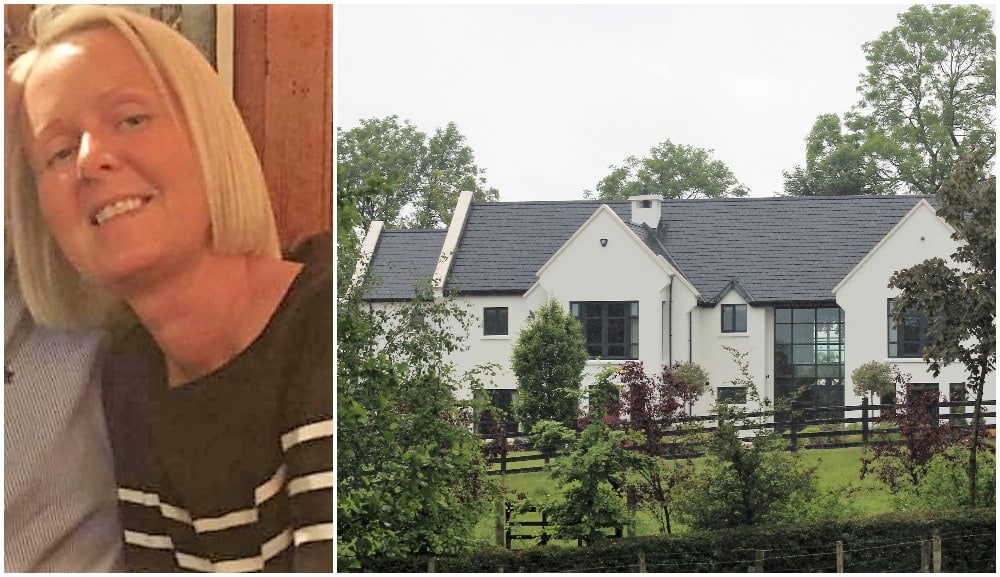
Almost six years after a woman was first arrested for defrauding her employers out of £1.9 million, her identity can finally be revealed as Julie McBrien, also known as Julie Hogg.
Even at sentencing at Dungannon Crown Court on Wednesday, her lawyers argued she should have lifetime anonymity, a move challenged by Press and which the judge accepted.
The reporting ban was imposed on the back of McBrien threatening to self-harm if her identity was published, which Press repeatedly challenged. This included seeking clarity on specific issues around McBrien’s claims, but none were ever addressed.
Despite accepting all charges two years ago, her lawyers sought reports from numerous experts in efforts to have her sent to hospital as opposed to jail.
She appeared for sentencing in the dock of Dungannon Crown Court dressed entirely in black and kept her head down, weeping throughout.
McBrien (47) with an address Screeby Road, Co Tyrone, committed 26 counts of fraud and money laundering over an eight year period. It was established she significantly breached the trust of her employers, Cookstown-based Northern Mouldings Limited, which is owned by Heron Brothers.
She was in charge of finances but despite enjoying a good salary, filtered cash from the company, bringing it to the verge of collapse.
Figures identified the expenditure sustained a luxury lifestyle for McBrien in her lavish mansion set in its own grounds.
Forensic examination discovered lifestyle spend of just over £141,000; general expenditure £360,000; property development £356,000; interior design £311,000; fashion and beauty £231,000 and £145,000 on jewellery.
Defence lawyers previously asked the prosecution to omit certain details from public disclosure, but this was refused.
McBrien made up false bank statements and forged the signature of a former employee after failing to remove his name from the bank mandate. She then forged a bank mandate making her solely in charge of finances, countersigning cheques to herself and creating false invoices.
She also confided in a company director claiming to have a rare form of cancer. This was exactly the same condition a close relative of the director had endured and he went out of his way to provide support for McBrien as his employee.
But there was no cancer and a particularly sensitive issue was deployed to continue funding her lifestyle without interference.
On arrest, she admitted the offences, initially claiming money was spent: “Just on holidays. There’s nothing to show for it.”
She blamed the company accountants for: “Not doing their job properly. If they had, I wouldn’t be here.”
At an earlier hearing the defence advised the court McBrien’s mansion “was on the market” but this turned out to be untrue.
Judge Brian Sherrard QC noted the company placed total trust in her which had been significantly abused.
“While dedicated colleagues faced huge financial impact while you enjoyed your luxury lifestyle. You were given preferential treatment by a director after claiming to have cancer. You were the author of that lie and benefited from it … You had no consideration for anyone affected by you. This money was simply dissipated by you and there was no argument for need. Your offending was borne out of avarice … You offended to meet the expectations of those around you.”
He also noted all psychiatric treatment was sought privately and not through her GP. While diagnosed as having a severe depressive episode McBrien declined intervention. There was never any indication she was unfit for trial.
A report obtained by the Prosecution found McBrien: “Has the ability to manipulate for her own ends and all assessments are based on her own assertions.”
Judge Sherrard dismissed the suggestion of imposing a hospital order, noting McBrien had not received treatment and none of the assessing experts took action to compel her to be detained for treatment.
Having received clarification, he was confident Hydebank Women’s Prison could properly manage McBrien’s condition and imposed a prison sentence of five-and-a-half years.
Welcoming the sentence, Detective Constable McKee from the Police Service of Northern Ireland’s Economic Crime Unit said: “This was a serious crime in which Julie McBrien defrauded her employer out of approximately £1.8 million for her own personal gain. She was given a position of trust and in return she chose to abuse that trust.
“Her actions have had far reaching consequences for her employers who worked tirelessly to establish their company and who, in spite of their immense financial loss, continue to contribute to the economy by employing people from the local community.
“I hope this sentencing sends out a clear message to anyone who thinks they can get away with this type of crime. We will work tirelessly to bring offenders before the courts so that that victims receive the justice they deserve.
“I would ask anyone who believes they are a victim of fraud to contact police on the non-emergency number 101.”



